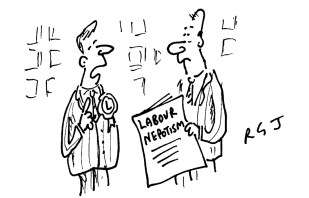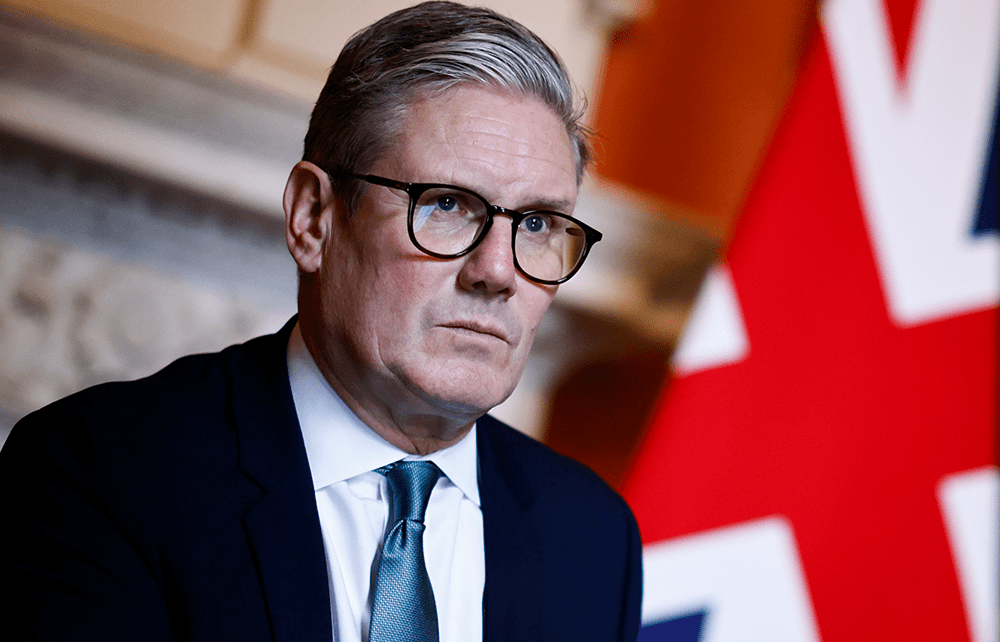Labour MPs ought to have been jubilant when they gathered for their weekly all-party parliamentary meeting on Monday. Most were still riding high after their party won a landslide majority. Yet there was a frisson of unease as some of the new flock took the opportunity to raise a grievance: the two-child benefit cap. ‘It’s the first week and they’re already complaining,’ sighed one MP this week.
The unhappiness has been brewing since last summer when Keir Starmer and his Chancellor, Rachel Reeves, said they were in no rush to lift the ‘nasty’ two-child benefit cap, introduced by Theresa May’s government in 2017. The policy, which restricts welfare payments to the first two children in a household, has been widely criticised by Labour frontbenchers as an emblem of Conservative cruelty. Some Labour MPs argue that abolishing the cap would lift 300,000 out of poverty at the cost of £1.7 billion – and that it would be money well spent. Reeves’s team has said that they’re open to the idea, but only when there is money to spare. This response is being held up by her supporters as evidence that the party is committed to fiscal responsibility.
‘Our biggest problem won’t be the hard left,’ says one of the 411. ‘It will be the bedwetters’
During the election, most Labour MPs were willing to bite their tongue. Now, more feel able to voice their unhappiness. ‘The majority is big enough that MPs feel they can relax a bit,’ explains a party adviser. Kim Johnson, a backbencher, and John McDonnell, flagbearer of the surviving Corbynite faction, have both threatened amendments to the King’s Speech if Starmer does not budge. This isn’t disloyalty, they insist: it’s helpful pressure. Plenty of Labour MPs – including newbies – suggest they would back an amendment were it there. But if they did, it would be a gesture. No one really thinks they have the numbers for it to pass. No Labour MP would be so suicidal as to vote down the King’s Speech which is, in effect, a confidence vote. ‘Rebelling and losing the whip in the first week – seems a great idea,’ says one new MP sarcastically.
Instead, the row is an important test of how Starmer intends to govern. If he buckles under pressure, he can, of course, expect much more. Where the cracks form in Labour will be of far more consequence in this parliament than what the diminished Tories say in opposition. ‘The number one aim for the first two years is to give nothing away to the left as it would be symbolic and we can’t afford it,’ says a senior Labour politician of the strategy for party management.
At the start of Boris Johnson’s premiership, his team thought a majority of 80 meant they didn’t have to worry about backbenchers (one No. 10 adviser even referred to them as ‘rats’ in the early days), only to find that the majority was shallow. Policies, such as planning reform, had to be watered down. When David Cameron tried to ‘manage’ his party by offering concessions, he ended up having to perform a lot of U-turns. A former Downing Street chief of staff was recently asked what the job was like. ‘It’s like walking through a radioactive wasteland trying not to touch anything and trying to stop anyone from touching you,’ he said.
The truth is that because the cost of welfare is so high already, Labour only has difficult choices. Starmer has already tried to win over the rebels by announcing a child poverty taskforce. Longer term, centrists imagine that a sugar-and-medicine mix may be served in the Autumn Statement, when Reeves could scrap the two-child limit while also bringing in tougher measures to keep a lid on any rise in welfare spending.
Despite Starmer’s purge of the left of his party before the election, 28 members of the Socialist Campaign Group survived, including Diane Abbott and Richard Burgon. This group, composed of serial Labour rebels, are trying to work out how much mischief they will be allowed to cause without losing the whip. They were once seen as harmless. ‘You really don’t have to worry about Jeremy Corbyn suddenly taking over,’ joked Tony Blair in 1996. There will be less complacency this time. Labour’s soft left is represented by around 60 MPs. Some, such as Lisa Nandy, have made it to the cabinet table. Others, such as Rosena Allin-Khan, are on the outside, ready to criticise Wes Streeting’s NHS reforms.
Around 50 former trade unionists are now Labour MPs. They come with an expertise and ideology of their own. Angela Rayner, Starmer’s deputy, is one such. Then there are the returning Blair-era union-whisperers (Douglas Alexander) and others who never went away (Pat McFadden). But the unions are not quite the Len McClusky-style Corbynite organisations of old. Their more recent leaders show a preference for realism over ideology.
Luckily for Starmer, the largest contingent in the party is made up of his Starmtroopers – carefully selected candidates who bring either important outside experience or match the current direction of the party. Georgia Gould, who he worked with in local politics, has already been given a ministerial role. Others, such as Josh Simons (the former chair of Labour Together, Starmer’s thinktank of choice), former Miliband adviser Torsten Bell and Charlie Falconer’s son Hamish are viewed as Labour princes-in-waiting. Some of the red princes are tipped for PPS jobs (glorified bag carriers) in the coming weeks. Managing this group when there are not enough jobs to go round will be hard work. Labour whips take the view that it is important that enough big posts go to MPs, rather than peers.

The new make-up of the party means that any fractures may not fall into the old definitions of hard left vs centrists or Brownites vs Blairites. ‘Our biggest problem won’t be the hard left,’ says a member of the 411. ‘It will be the bedwetters.’
In other words, the most bothersome divide to party management could simply come down to those who can and can’t cope with making difficult decisions. As this week’s King’s Speech showed, Labour’s plan is to ‘go for growth’ – for lack of other options. ‘The planning policy will be unpopular,’ says one new MP. ‘I’m not sure which of my colleagues will be able to handle the backlash. That will be the new Labour divide.’








Comments